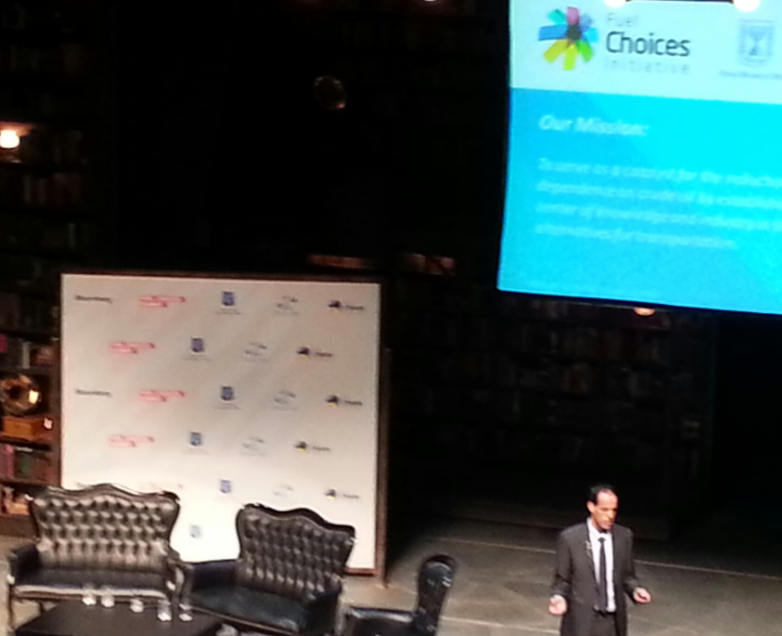 At the Bloomberg Fuel Choices Summit in Tel Aviv, we learned about Israel’s aggressive alternative transportation goals–reducing oil use by 60% by 2025–and how they plan to achieve it. A talk by Eyal Rosner of the Prime Minister’s office elucidated some of the insights the country has learned from its various clean tech programs over the years and where the country is heading. Rosner is Chairman of the Alternative Fuel Initiative.
At the Bloomberg Fuel Choices Summit in Tel Aviv, we learned about Israel’s aggressive alternative transportation goals–reducing oil use by 60% by 2025–and how they plan to achieve it. A talk by Eyal Rosner of the Prime Minister’s office elucidated some of the insights the country has learned from its various clean tech programs over the years and where the country is heading. Rosner is Chairman of the Alternative Fuel Initiative.
The country has conducted more than 10 pilot programs (e.g., electric buses, CNG heavy duty use, fleet management), and plans to standardize and regulate the transportation industry in the country based on the results of these pilots. The country is also planning a tax and subsidy program that will incentivize cleaner fuels and more efficient vehicles. A highly efficient electric car, said Rosner, might pay 8% in taxes, whereas a gas guzzling SUV with few pollution controls might pay 90% in taxes. “And we will have everything in between,” said Rosner.
In the United States, this sort of program would likely be decried by certain elements (namely the Tea Party) as socialism, but, as Rosner pointed out, the costs to Israel of not acting are too great…his economic office indicated that with the incentives, taxes, and programs they’re putting in place and the innovation they have seen so far, they expect over 1% GDP growth year over year just from their alternative transportation sector.
In addition to the programs and incentives, the last element, and the one that the Fuel Choices Summit focused on, was innovation at the startup level. “It is not our job to decide whether one solution is a good solution or not, it is our job to create the environment in which entrepreneurs can thrive,” Rosner said. So the country is conducting startup boot camps focused on sustainability oriented entrepreneurs, and providing them with small amounts of seed money based on their market potential and ability to solve Israel’s transportation challenges. “We know what happens when an industry is dependent on subsidies–we’ve seen this in solar,” said Rosner. “These solutions have to make economic sense.” Rosner put up the following slide, showcasing what they’ve seen from their studies so far as the most economically viable alternative transportation solutions:

Does Rosner feel like these initiatives will help Israel reach its aggressive renewable energy goals? “It’s not that we want to do it,” he said, “it’s that we have to do it.” Israel is geographically and politically isolated, and sends a lot of its money out of the country to import energy. The country is experiencing a natural gas boom, hence the focus on heavy duty trucks running on CNG, but otherwise, the country sees renewables as its only path forward.
Download the Fuel Choices Initiative Brief here (PDF) for more information.
Reporting live from Israel for the Bloomberg Fuel Choices Summit, I can tell you that the innovation inherent in this culture has me very optimistic about Israel’s path forward in weaning itself off imported, dirty fuel. One other solution that I don’t think they’re talking about yet, but hope will become part of the equation, is the privatization of highways. If highways were no longer free for drivers, the additional cost of transportation would help encourage alternatives such as carpooling, public transit, and the like. In addition, it would reduce the country’s tax burden both from the direct sale of the highways (providing large up front government revenues), while also reducing the maintenance burden year after year from taxpayers.


